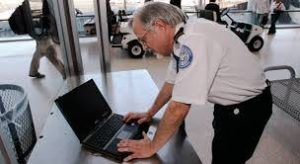This week in the US many news outlets are reporting a story that relates to how private the data on your computer, hard drive or mobile phone may be when passing national borders.
In a legal ruling a judge has in effect supported immigration officials’ rights to look inside your computer if you want to bring it in to the USA. The court ruling relates to an incident in 2010 when Pascal Abidor, a student crossing from Canada, had his laptop confiscated and searched.
The student claimed that this was unconstitutional as the 4th amendment states that “The right of the people to be secure in their persons, houses, papers, and effects, against unreasonable searches and seizures, shall not be violated….” The US has long held however that this amendment cannot be upheld when dealing with people entering the country.
The judge ruled however that “The agents certainly had reasonable suspicion supporting further inspection of Abidor’s electronic devices”. What is not widely reported is the circumstances that lead to this decision. Abidor has both French and US passports, and upon entering he chose to show the passport that did not contain Visas that demonstrated that he had visited Lebanon and Jordan, giving officials the impression that he was trying to hide something.
Agents spent five hours searching his laptop and USB drives, and then demanded that he write down his passwords and hand over the laptop and storage media. The laptop was returned by post 11 days later.
There are rules about what the authorities must do with data seized in these cases. All data that is deemed innocent must be destroyed within 7 days of seizure unless permission is given to keep it for longer. Many blogs however cast doubt upon whether an unregulated and poorly reported system can actually enforce this however, an online search of the story gives many different perspectives. The Homeland securities News Wire has one of the most informative.
I presume that like me many of you keep a great deal of personal data on your laptops, from tax returns, bank details, love letters and personal photos, and all of these things may be accessed in a case like this. One issue that has come to the fore has been brought by researchers and reporters, who may not be able to reveal sources of information for ethical, security or legal reasons, but may unwittingly do so by leaving evidence of their informers’ identities on their computers.
The line is blurred here, as today smuggling must include information smuggling and authorities may need to search information media, but an individual must be aware that all information carried over an international border is open to search. This must have repercussions in terms of industrial as well as personal privacy.

